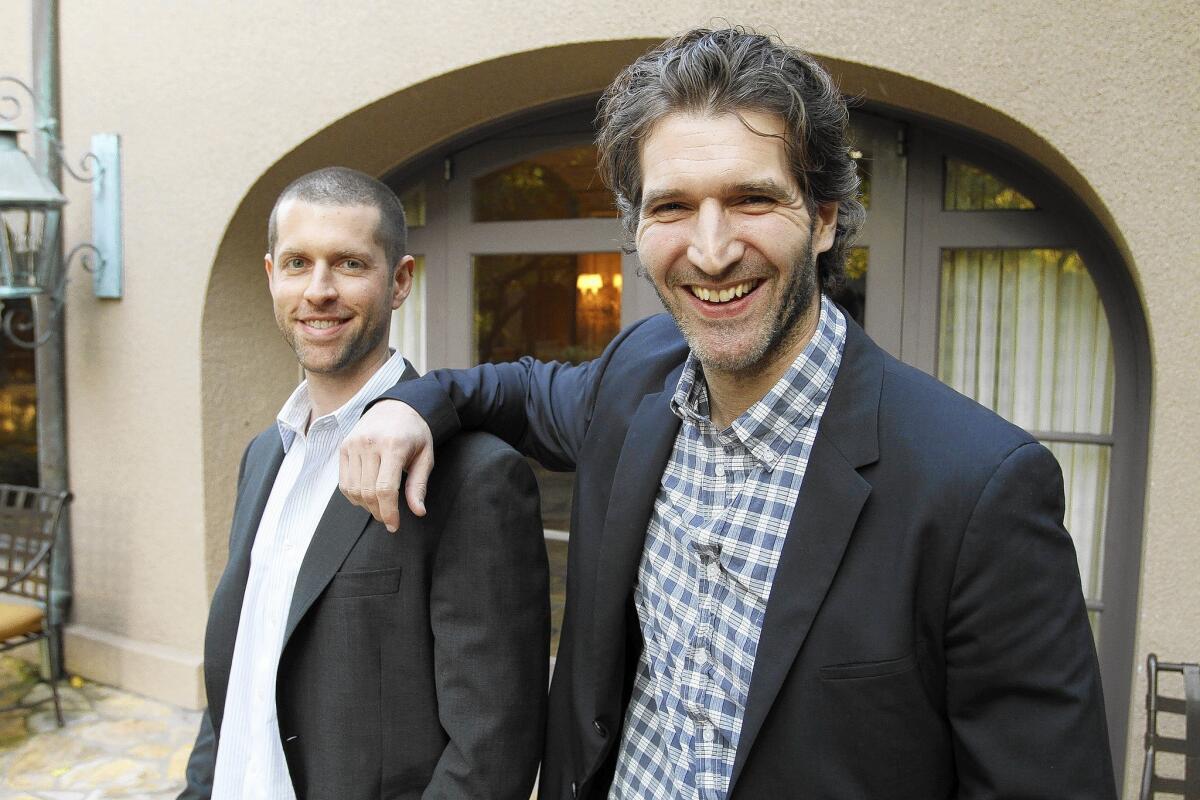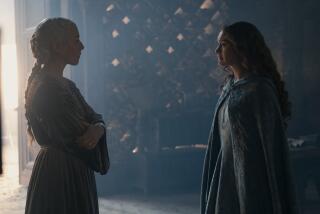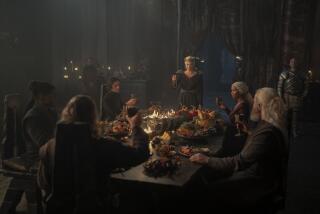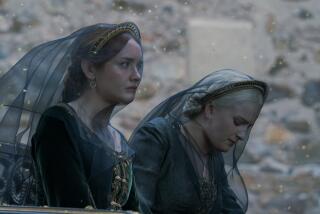‘Game of Thrones’ writers on season finale and why ‘All Men Must Die’

Warning — the following article contains major spoilers about the season finale to “Game of Thrones.”
Wrapping up its fourth season, HBO’s “Game of Thrones” has not just avoided toppling under the weight of its own story lines, it’s become a bona fide cultural phenomenon, with an audience larger than even “The Sopranos.” Going into the final episode of the fourth season, writers D.B. Weiss and David Benioff promised the show’s best finale ever.
It’s difficult to imagine any scene that could beat Emilia Clarke’s Daenerys rising from the ashes adorned only in baby dragons, and not surprisingly, Sunday night’s episode was not made available to critics for Monday deadlines. But Weiss and Benioff did answer many questions about the season and its finale.
Who chose this season’s tag line, “All Men Must Die”? And was there a lot of “and we mean it literally” laughter in the meeting?
We suggested the tag line because the phrase has such resonance in the books (and, we hope, the series). Since we hopscotch between so many story lines in the show, it’s difficult to find a single sentence that’s relevant for all of the characters. “All Men Must Die” seemed appropriate for this bloody season.
Our friend Rob McElhenney suggested “All Men Must Breathe” or “Everyone Poops,” but HBO rejected these offerings.
Throughout the series, Tyrion has been one of the few truly noble characters, in that he has tried to protect those less fortunate and never killed anyone out of malice or even vengeance. Although I was certainly happy to see Tywin go, I felt bad that Tyrion killed him, and I can’t even talk about Shae. How do you feel about the new Tyrion and how does his transformation affect the tone of the show?
As much as Tyrion tries to shield himself with self-deprecating humor, wine and faux cynicism, the events of this season have battered his psyche. We see him start to drop the facade during the trial sequence, where he is framed for a murder he didn’t commit. We see it in the scene with Oberyn, when Tyrion learns how his sister tortured him even as an infant. And finally we see his reaction when Oberyn, his champion, dies horribly, and Tyrion hears his own father sentence him to death. He’s a good man, but he’s been pushed too far, and his decision to seek vengeance in the finale shows this is not the Tyrion Lannister we first met in the Winterstown brothel.
How did Peter Dinklage react to news of his upcoming rampage? Or did he already know?
You know what Peter calls a rampage like that? Tuesday.
We’ve been talking to Peter and Sibel [Kekilli, who plays Shae] about their final scene together for a long time. We would have talked to Charles [Dance, who plays Tywin] about his final scene, but we’re afraid of him. Just kidding, Charles. Honestly, Charles. It was George, Charles! Blame George!
Sibel insists that we bring her back as a zombie. We told her that’s “Walking Dead”; we have wights on our show. She said something unprintable in German.
At this point, everyone has someone’s blood on their hands — Daenerys has grown a bit more ruthless, Arya loves to kill in a way that is a bit upsetting. Meanwhile, characters like Jaime Lannister and the Hound become more human. So what is the “Game of Thrones” definition of a hero?
The definition of a hero is the same in “Game of Thrones” as it is everywhere else; the problem is that heroes in “GoT” rarely survive for long. Ned Stark was a hero, so was his son Robb, so was Oberyn Martell. Courage, nobility and a refusal to compromise are admirable qualities — and generally fatal in Westeros. The characters who endure tend to be more adaptable, more willing to evolve to conditions in a merciless world. Daenerys has shown a ruthless side ever since the moment she unflinchingly watched her brother’s skull melt. As a queen, she shows great compassion for the powerless and a willingness to destroy anyone who stands in her way. To some she’s a heroine; to others she’s a foreign tyrant with messianic delusions.
Arya’s childhood was ravaged by violence. Everyone she loved and trusted has been brutally murdered: her father; her mother; her brother; even Yoren, who rescued her from King’s Landing. She has decided she will not be a victim. Her nighttime lullaby is her own personal hit list. She doesn’t care about being a hero: She cares about surviving and avenging her family.
The closest thing we have to a classic hero is Jon Snow, who always tries to do the right thing and believes in the lessons Ned Stark taught him. His inherent nobility is both a strength and a weakness and gets him in trouble time and again.
How fun was it to put giants on mammoths in the penultimate episode? And did you think “take that, Peter Jackson!”?
All credit to the VFX department for bringing them to life. And to Peter Jackson for showing that a mesmerizing adaptation of a high fantasy classic was possible. Nobody would have green-lit “Game of Thrones” if not for the success of Mr. Jackson’s “Rings” trilogy.
I would think one of the biggest challenges you face, besides losing main characters at an alarming clip, is juggling all those story lines and giving everyone enough screen time. I am imagining an enormous white board, but maybe you guys should be the next spokesmen for iPad — seriously, how do you keep it all going? Do you break the script episode by episode? Or do you treat it more like a 10-hour film?
We’re Luddites, so we use index cards on corkboards. Each story line (Castle Black, say, or Arya/Hound) gets its own color. At our peak in Season 3 we were up to 13 different colors. One upside of losing main characters at an alarming clip is we no longer have to use taupe or mauve. Once we’ve mapped out each story line we start putting cards on the board and argue over which scenes should be in which episode and in what order. We end up reordering quite a bit in post, when we’ve seen the directors’ cuts and realize certain transitions make more sense than others.
Who’s been the hardest character to let go of so far?
Ah, we’d be like grandparents trying to choose a favorite grandchild. And it’s hard to separate the characters from the actors. We miss them all.
Except Rose Leslie [the Wildling Ygritte], who is evil incarnate.
What has surprised you most about the audience reaction to the show? And now that you’re officially “bigger than ‘The Sopranos’” do you ever panic and wonder “how are we going to top that?”
Well, as far as being “bigger than ‘The Sopranos’” — plenty of television shows had higher ratings than David Chase’s masterpiece. But how many had a more enduring impact on our culture? “The Sopranos” changed everything.
So there’s no point in panicking about topping “The Sopranos,” because we won’t. But that’s OK. We have hundreds of other things to panic about. We have a schedule so we don’t forget to panic about anything that needs panicking.
I have to ask: How did they make Oberyn’s head explode? And how many takes? Those few gory seconds took a remarkable team effort: Barrie Gower, our prosthetics whiz, created a skull for the Mountain to crush. Our brilliant VFX team, led by Steve Kullback and Joe Bauer, worked on the illusion of the Mountain’s thumbs digging into Oberyn’s eye sockets, then partially reconstructed Oberyn’s face for the gruesome aftermath shot. Tim Kimmel and the sound team came up with that awful sound of the skull exploding. All this grisly gorgeousness was pieced together by ace editor Tim Porter, and directed by the incomparable Alex Graves.
I’ve been camping this week, and I have to admit my relationship to crows has changed significantly. Are there things about this story, or this experience, that have changed the way you look at or think about things?
No one invites us to weddings anymore. It all went exactly according to plan.
More to Read
The complete guide to home viewing
Get Screen Gab for everything about the TV shows and streaming movies everyone’s talking about.
You may occasionally receive promotional content from the Los Angeles Times.







